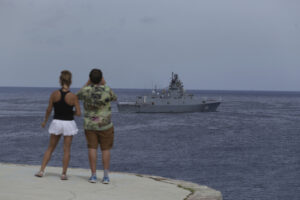New Developments on the Stagnant Nagorno-Karabakh Conflict

 Photo courtesy Office of the NKR President
Photo courtesy Office of the NKR President
Bako Sahakyan, the president of a mountainous Central Asian de facto state roughly the size of Rhode Island, visited Washington, DC on Wednesday, March 14. This is the first time the president of the self-proclaimed Republic of Nagorno-Karabakh, which is wedged between Armenia and Azerbaijan, has been to Washington, DC since the 1990s. Sahakyan most notably spoke to congressional representatives regarding a new resolution that would legitimize the Republic.
The Nagorno-Karabakh has been a source of conflict between Armenia and Azerbaijan since 1988, when the regional government of the region declared its secession from the Republic of Azerbaijan. Armenia has supported the de facto state and holds military control over the territory. Azerbaijan promises to take back the land, by force if necessary. The conflict escalated into open war from 1992–1994, but Russia brokered a ceasefire which the states have generally respected, though there continue to be occasional violations of the agreement.
Following the ceasefire agreement, a peace coalition called the Minsk Group—chaired by the United States, Russia and France—was established by the Organization for Security and Co-operation in Europe. Beyond its role as a neutral third-party arbiter, the United States maintains consistent positive bilateral relations with both Azerbaijan and Armenia. The United States has worked extensively with Azerbaijan on its oil and gas production to Europe, and its military cooperation in Afghanistan. Simultaneously, the United States provides significant aid to landlocked Armenia and acknowledges its rich cultural history.
Sahakyan came to DC regarding a legislative resolution initiated by Representative Frank Pallone (D-NJ), who co-chairs the congressional Armenian Caucus and has visited the Karabakh on multiple occasions. The resolution seeks to acknowledge the Republic of Nagorno-Karabakh, also called the Republic of Artsakh, as a legitimate de jure entity in the Minsk Group peace coalition; and to open direct and official communication channels with the United States government on all levels.
When the Republic of the Nagorno-Karabakh announced its secession from Azerbaijan in 1988, international law deemed it illegitimate. Because of this illegitimacy and the volatile nature of the conflict, no national government has officially recognized the Karabakh as a state, not even Armenia. The conflict began when the Soviet Union arbitrarily awarded the Karabakh region to Azerbaijan, despite Armenia’s historical ownership and the region’s predominantly ethnic Armenian inhabitants. Following a long history of struggle between Persia and Russia for self-determination, this conflict challenges Azerbaijan’s territorial integrity, and threatens an element of its self-determination. Both states want the territory for themselves, though it holds little strategic value given its lack of natural resources.
Azerbaijan objected to Sahakyan’s Washington, DC visit by sending a note to the US Embassy in Baku, stating that by granting him a Visa the United States violated its commitment to neutrality in this conflict. Furthermore, Azerbaijan said it will retaliate against the United States “on the principle of reciprocity” for its implicit acknowledgement of the “self-proclaimed” regime.
Although Azerbaijan has not specified the potential reciprocity, it recently threatened to cut off NATO military cooperation in Afghanistan over escalated US pressure concerning its human rights violations. However, these threats do not hold much weight. First, Azerbaijan’s contribution to the Afghanistan coalition is relatively small, except for the permitted use of its airspace for the transportation of military cargo. Second, the US military partnership with Azerbaijan is more beneficial to Azerbaijan because it offsets the Russian geopolitical pressure in the region. Third, the United States can leverage its $13 million in annual assistance to Azerbaijan.
The United States has not publicly responded to the Azerbaijani threats. Considering the low credibility of the threat and its lack of relevance to US interests, it is unlikely that the United States will comment on this event.
Sahakyan’s visit to Washington, DC is unlikely to have a significant impact on the conflict. However unlikely, if the recognition of the Republic of Nagorno-Karabakh passes, it would have a significant negative effect on the US role in the peace process as a Minsk Group co-chair, and on US-Azerbaijani relations.
The acknowledgment of a breakaway state in conflict resolution statecraft is most often the reward of a successful resolution to the conflict, and doing so prematurely could cause further protraction, as was the case in Kosovo. Yet the peace process has been frozen since 2016 while both Armenia, in military partnership with the Karabakh government, and Azerbaijan routinely violate the ceasefire agreement at least once a year.
The Nagorno-Karabakh conflict is likely to remain in its contentious and protracted state for the foreseeable future. But if US unilateral behavior prevails, the already slim possibility for peace would be reduced, potentially reigniting the violence seen in 2016. Should the United States and Minsk Group work to reopen a frequent dialogue between Azerbaijan and Armenia without Karabakh leadership, there is greater hope for an aversion to the looming violence from increased tensions.
Anthony Branch is a Master’s Student in International Relations, Middle East and Levantine Studies at New York University. He is a 2018 International Fellow at the Caucasus Research Resource Center – Armenia. His research interests include U.S. national security, geopolitics, the Middle East, and the South Caucasus.




